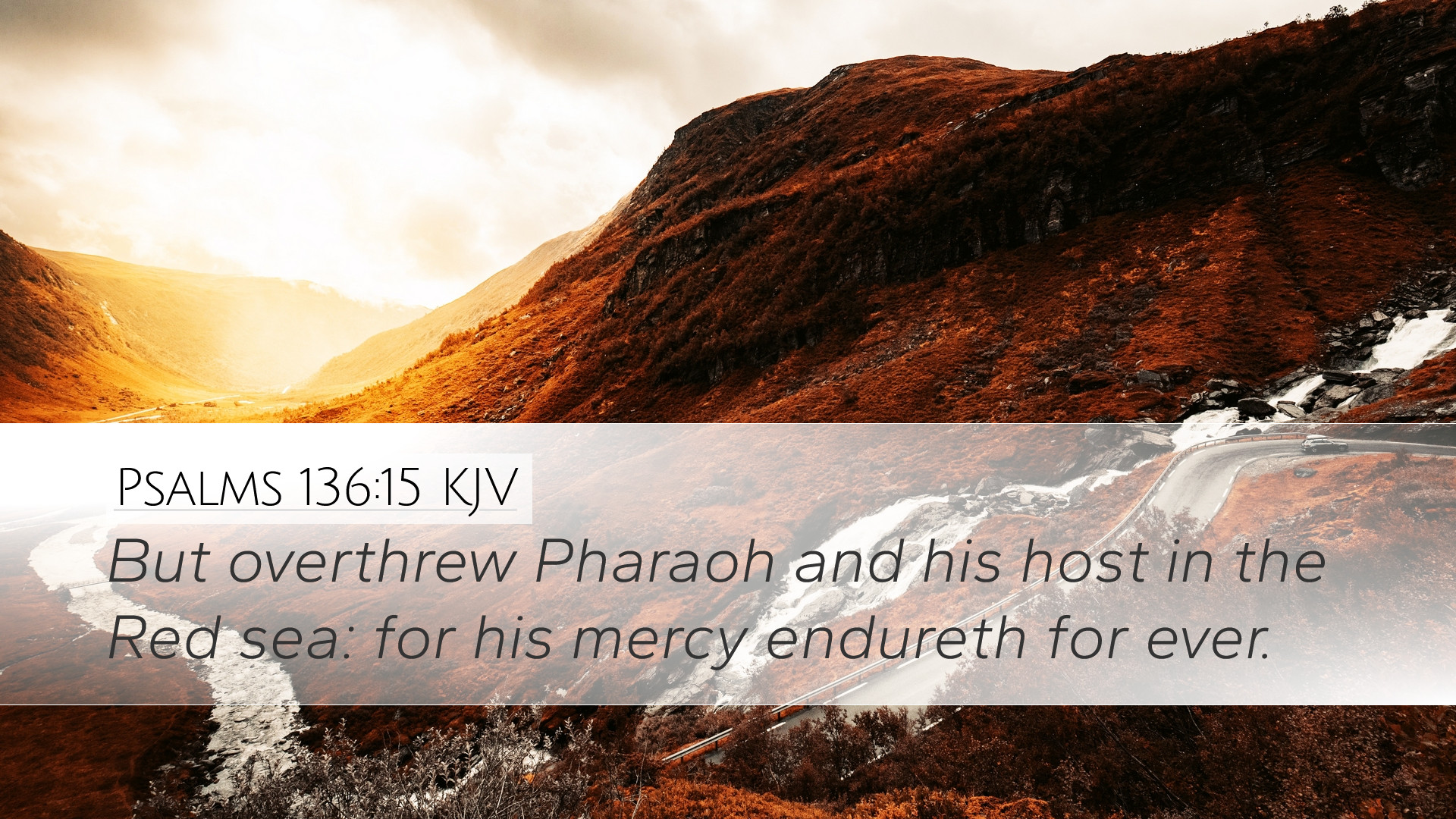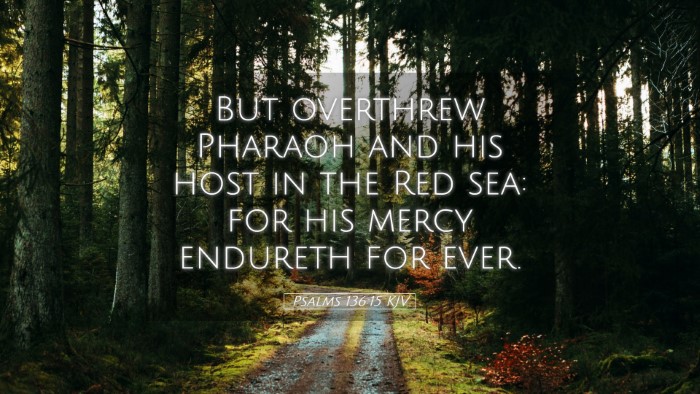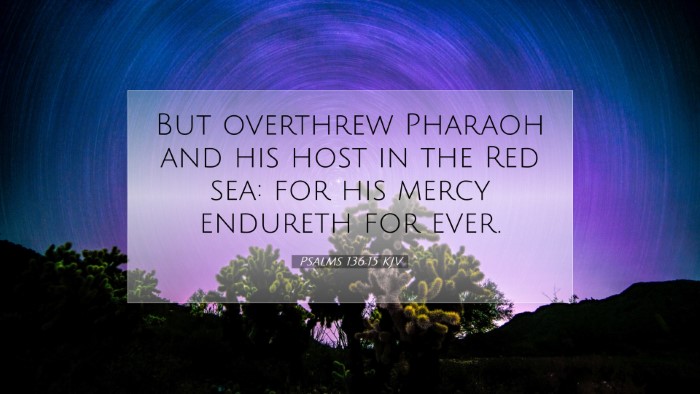Commentary on Psalms 136:15
Psalms 136:15 states: "But overthrew Pharaoh and his host in the Red sea: for his mercy endureth forever." This verse is a proclamation of God's enduring mercy as evidenced by His mighty intervention in the exodus narrative, affirming the themes of deliverance and judgment.
Introduction
This verse encapsulates a pivotal moment in Israel's history, where God displays His sovereignty over nations and deities by delivering His people while judging their oppressors. The reference to Pharaoh's overthrow at the Red Sea serves as a vivid reminder of God's power and mercy, a theme repeated throughout Scripture. In this commentary, we examine insights from historical theological perspectives, particularly those of noted commentators Matthew Henry, Albert Barnes, and Adam Clarke.
Overview of Psalms 136
The Psalms 136 is a song of thanksgiving, celebrating the steadfast love and faithfulness of God. Each verse pairs a specific act of God with the refrain "for His mercy endureth forever." This repetition emphasizes that God’s mercy is the foundation for all creation and history.
Historical Context
The events referenced in this psalm connect to the Exodus narrative in the Old Testament (Exodus 14), where God delivers the Israelites from Egyptian bondage. Understanding the context of this deliverance enhances the significance of God's mercy described in this verse.
Insights from Commentators
Matthew Henry
Matthew Henry highlights that the destruction of Pharaoh and his host serves both as a warning and encouragement. He states, “God's judgments upon Pharaoh should serve as a demonstration of His everlasting mercy to His people.” Henry emphasizes that God's mercy does not merely save but also judges. He points out that the overthrow of Egypt represents the triumph of divine justice and mercy intertwined. The psalmist calls all to remember this truth, reminding the faithful that mercy is as much about deliverance from the oppressor as about the mercy shown to the oppressed.
Albert Barnes
Albert Barnes notes that the mention of the Red Sea emphasizes God's omnipotence and His capability to intervene in human affairs. Barnes writes, “The destruction of the Egyptian army was an act of divine mercy towards Israel, but an act of righteous judgment against their enemies.” He interprets the phrase “His mercy endureth forever” as reflective of God's covenant loyalty, which remains unbroken despite human unfaithfulness. Barnes calls on readers to see the continuity of God’s redemptive plan, where Hebrew people emerge from bondage not just to exist but to enter into a relationship with God rooted in His promises.
Adam Clarke
Adam Clarke approaches this verse with a focus on the theological implications of divine intervention. Clarke observes that the event serves as a significant demonstration of productive mercy for Israel. He posits that this overthrow was not merely a historical fact but a component of God's ongoing narrative of redemption for humanity. Clarke emphasizes that “the Red Sea crossing is not only a historical deliverance but a foreshadowing of the spiritual deliverance available in Christ.” Thus, he connects the deliverance of Israel to the New Testament themes of salvation, noting that just as Pharaoh's armies were destroyed, so too are the powers of sin and death defeated through Christ's sacrifice.
Theological Reflections
Each commentator compels us to wrestle with the theological implications of God's mercy as it intersects with His justice. The destruction of Pharaoh signifies the seriousness of rebellion against God and demonstrates that His mercy, while extended to His people, operates within the framework of holiness and divine order.
God's Sovereignty
The verse affirms God's sovereignty over all nations for His purpose. The narrative underscores that God actively shapes history and works out His plan of redemption, reminding readers that no power can stand in the way of His will.
The Enduring Nature of God's Mercy
The refrain “for His mercy endureth forever” serves as the heart of the psalm, encapsulating the enduring nature of God’s grace. This eternal aspect of God's mercy is fundamental not only to understanding the psalm but to grasping the biblical narrative—God’s mercy transcends time and is directed toward all creation.
Application for Today
- Celebration of Deliverance: Believers today are encouraged to celebrate their deliverance from sin, paralleling Israel's deliverance from Egypt.
- Assurance of God's Mercy: The psalm assures folks of God's disposition toward mercy, prompting a response of gratitude and worship.
- Moral and Ethical Reflection: It invites self-examination about one’s attitude toward oppressors and the significance of justice in society.
Conclusion
Psalms 136:15 is a profound statement of God's action in history marked by mercy, inviting introspection and gratitude. Drawing from insights by Matthew Henry, Albert Barnes, and Adam Clarke enriches our understanding of this verse, calling believers to grasp both the weight of divine judgment and the depth of His mercy, which endureth forever. It reinforces a theological understanding that God's mercy is foundational to the narrative of redemption—an eternal assurance for all who place their faith in Him.


